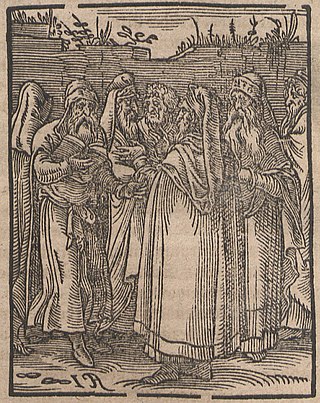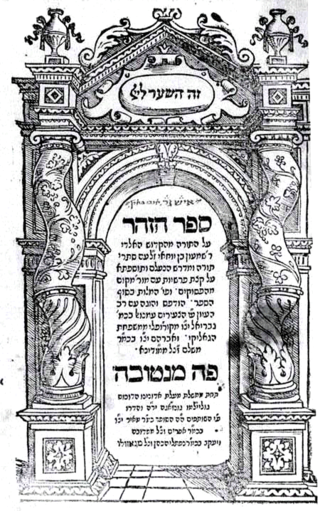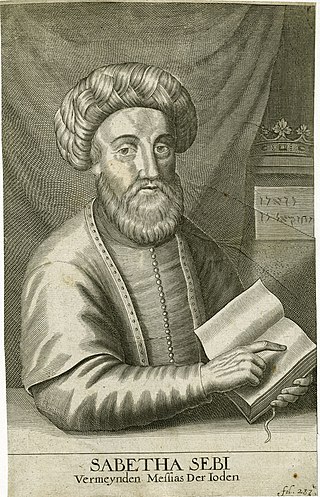Related Research Articles

Kabbalah or Qabalah is an esoteric method, discipline and school of thought in Jewish mysticism. A traditional Kabbalist is called a Mekubbal. The definition of Kabbalah varies according to the tradition and aims of those following it, from its origin in medieval Judaism to its later adaptations in Western esotericism. Jewish Kabbalah is a set of esoteric teachings meant to explain the relationship between the unchanging, eternal God—the mysterious Ein Sof —and the mortal, finite universe. It forms the foundation of mystical religious interpretations within Judaism.

The Zohar is a foundational work in the literature of Jewish mystical thought known as Kabbalah originally written in Aramaic. It is a group of books including commentary on the mystical aspects of the Torah and scriptural interpretations as well as material on mysticism, mythical cosmogony, and mystical psychology. The Zohar contains discussions of the nature of God, the origin and structure of the universe, the nature of souls, redemption, the relationship of Ego to Darkness and "true self" to "The Light of God".

The Sabbateans were a variety of Jewish followers, disciples, and believers in Sabbatai Zevi (1626–1676), a Sephardic Jewish rabbi and Kabbalist who was proclaimed to be the Jewish Messiah in 1666 by Nathan of Gaza.

Sabbatai Zevi, also spelled Shabbetai Ẓevi, Shabbeṯāy Ṣeḇī, Shabsai Tzvi, Sabbatai Zvi, was a Jewish mystic and ordained rabbi from Smyrna. A kabbalist of Romaniote or Sephardic origin, Zevi, who was active throughout the Ottoman Empire, claimed to be the long-awaited Jewish Messiah. He was the founder of the Sabbatean movement.

Abraham ben Samuel Abulafia was the founder of the school of "Prophetic Kabbalah". He was born in Zaragoza, Spain in 1240 and is assumed to have died sometime after 1291, following a stay on the small and windswept island of Comino, the smallest of the three inhabited islands that make up the Maltese archipelago.

Gershom Scholem, was a German-born Israeli philosopher and historian. Widely regarded as the founder of modern academic study of the Kabbalah, Scholem was appointed the first professor of Jewish mysticism at Hebrew University of Jerusalem.
Mordecai Mokiach was a Jewish Sabbatean prophet and Messiah claimant.

Nathan of Gaza or Nathan Benjamin ben Elisha Hayyim haLevi Ashkenazi or Ghazzati) was a theologian and author born in Jerusalem. After his marriage in 1663 he moved to Gaza, where he became famous as a prophet for the Jewish messiah claimant Sabbatai Zevi.
Abraham Miguel Cardozo was a Sabbatean prophet and physician born in Rio Seco, Spain.
Moses ben Mordecai Zacuto, also known by the Hebrew acronym RaMa"Z, was a rabbi, Kabbalist, and poet. Zacuto, who was born into a Portuguese Marrano family in Amsterdam, studied Jewish subjects under Saul Levi Morteira. He also studied secular subjects, such as the Latin language. As a pupil of Morteira, he may also have been, as a youth still in Amsterdam, a fellow student of Baruch Spinoza.
Joshua Heschel Zoref (1633–1700) was a 17th-century ascetic, and an important figure in the Lithuanian Sabbatean movement. During the messianic fervor of 1666, he claimed to experience visions similar to those of Ezekiel. He, like Judah Leib Prossnitz also, considered himself to be possessed of the role of Messiah ben Joseph, with Shabbatai Tzvi playing the role of Messiah ben David.
Gedaliah ibn Yahya ben Joseph was a 16th-century Italian Talmudist and Biblical chronologist chiefly known for his Biblical Chronology "Shalshelet HaḲabbalah".

Frankism was a heretical Sabbatean Jewish religious movement of the 18th and 19th centuries, centered on the leadership of the Jewish Messiah claimant Jacob Frank. Frank rejected religious norms and said that his followers were obligated to transgress as many moral boundaries as possible. At its height it claimed perhaps 50,000 followers, primarily Jews living in Poland, as well as in Central and Eastern Europe.
Moses Pinheiro was an Italian Jew who lived in Livorno in the seventeenth century. He was one of the most influential pupils and followers of Sabbatai Zevi.
Behr Shmuel Issachar Leyb ben Judah Moses Eybeschuetz Perlhefter was a Jewish scholar and rabbi. His educated wife Bella bat R. Jakob Perlhefter, corresponded in Hebrew and wrote the preface on the Yiddish book “Beer Sheva”. Perlhefter taught the German Christian Hebraist Johann Christoph Wagenseil Hebrew and Jewish literature. Beer Perlhefter is considered an important figure of the Sabbatian movement. After the death of the pseudo-Messiah Sabbatai Zevi (1626-1676), he restored the Sabbatian theology at the school of Abraham Rovigo and called the Pseudomessiah Mordecai Mokiach to Italy.
Moshe ben Chasdai Taku was a 13th-century Tosafist from Tachov, Bohemia. Despite his own seemingly mystical orientation, Rabbi Taku is controversially known to have been an opponent of both the esoteric theology of the Chassidei Ashkenaz and the philosophical orientation of rabbinic rationalists such as Saadia Gaon, Maimonides, Abraham ibn Ezra et al. He believed that both trends were a deviant departure from traditional Judaism, which he understood to espouse a literal perspective of both the biblical narrative, and the Aggadata of the Sages. His opposition to all theological speculation earned him, in the opinion of Gershon Scholem, the title of one of the two truly reactionary Jewish writers of the Middle Ages.
Abraham Pereyra was a wealthy and prominent Portuguese Jewish merchant, who lived in Amsterdam from circa 1644 to his death in 1699.
Meir bar Hiyya Rofe was a Hebron rabbi, known among other things for his tours of Europe as an emissary from the Holy Land on behalf of the Jewish community of Hebron. His father, Hiyya Rofe, was a very learned rabbi from Safed. Orphaned at a young age, Meir studied in Hebron, leaving about 1648 as an emissary to Italy, Holland, and Germany. On his return journey, he stayed for two years in Italy to publish Ma'aseh Ḥiyya, his father's talmudic novellae and responsa. In Amsterdam he had influenced the wealthy Abraham Pereyra to found a yeshiva in Hebron to be called Hesed le-Avraham, of which Meir himself became the head scholar.

Yehuda Liebes is an Israeli academic and scholar. He is the Gershom Scholem Professor Emeritus of Kabbalah at the Hebrew University of Jerusalem. He is considered a leading scholar of Kabbalah; his other research interests include Jewish myth, Sabbateanism, and the links between Judaism and ancient Greek religion, Christianity, and Islam. He is the recipient of the 1997 Bialik Prize, the 1999 Gershom Scholem Prize for Kabbalah Research, the 2006 EMET Prize for Art, Science and Culture, and the 2017 Israel Prize in Jewish thought.
Hemdat Yamim is a book dealing with Jewish customs and laws, including many musar exhortations. It is based on kabbalah in general, and the kabbalah of the Ari in particular.
References
- ↑ Scholem, Gershom (2007). "Rovigo, Abraham ben Michael". In Berenbaum, Michael; Skolnik, Fred (eds.). Encyclopaedia Judaica . Vol. 17 (2nd ed.). Detroit: Macmillan Reference. pp. 500–501. ISBN 978-0-02-866097-4 – via Gale Virtual Reference Library.
- ↑ Scholem, Gershom, Sabbatai Sevi: The Mystical Messiah: 1626–1676, Princeton University Press, Princeton, 1973, p. 771. This correspondence was published by Isaiah Tishby in Sefunoth, III-IV (1960), pp. 71-130.